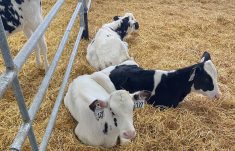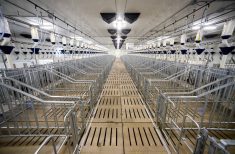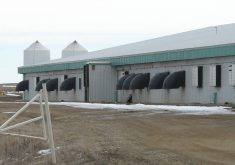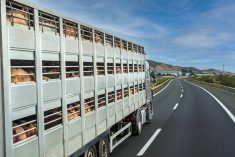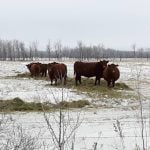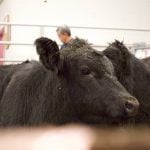Having reviewed its pork suppliers’ plans to phase out the use of gestation stalls for breeding sows, Canada’s iconic Tim Hortons chain now expects to have moved to stall-free pork by the year 2022.
In the Oakville, Ont. company’s annual Sustainability and Responsibility report, released April 3, Tim Hortons said it has “consulted with our suppliers, the pork industry and other stakeholders on the use of gestation stalls for breeding sows and reviewed their plans throughout 2012.”
In mid-2012 the company gave its pork suppliers until the end of the year to have clear plans in place to phase out sow gestation stalls. With those plans in hand, the company says that “by 2022, we will source pork from suppliers who have made a transition to alternative open housing.”
Read Also

Beekeepers want financial protection against tropi mite
What happens to beekeepers if the deadly tropi mite reaches Canada? Discover why farmers want robust compensation to protect pollination.
The chain has also pledged to “work with the pork industry and governments to advance standardized approaches and codes resulting in more humane and sustainable open-housing systems” and to “support efforts to improve traceability systems and verification.”
Tim Hortons last summer had also set a target to be purchasing at least 10 per cent of its eggs from producers who use “enriched-housing systems” for layer hens by the end of 2013 and to “progressively increase our commitment beyond 2013 as additional supply becomes available.”
The company said it’s on track to meet that goal which represents the purchase of more than 10 million eggs.
On the animal welfare front, the company’s report also noted its move to set up the Tim Hortons Sustainable Food Management Fund at the University of Guelph.
The company also reiterated it plans to hold a “North America-wide restaurant industry summit focusing on academic research about animal welfare issues and best practices” this fall.
Tim Hortons, founded in Hamilton in 1964, has expanded in scope and influence to become one of the biggest publicly traded quick-service restaurant chains in North America based on market capitalization, and the largest in Canada.
Animal welfare organizations hailed the chain’s next step on sow stalls.
Matt Prescott, food policy director for farm animal protection with the Humane Society of the United States, said the company is “addressing one of the most critical animal welfare issues in food production today” and the move “supports the food industry’s rejection of gestation crates as irresponsible, unsustainable and inhumane.”
In the same release, Sayara Thurston, a campaigner with the Montreal-based Canadian arm of Humane Society International, noted the ongoing review by Canada’s National Farm Animal Care Council of its code of practice for the care and handling of pigs.
NFACC, which oversees the development of codes of practice for farm animals, said in December it expects to meet a June 1 target to begin the public comment period on the revised code for pigs.
Florian Possberg, chair of the council’s pig code committee, said in a release last month that gestation stalls, along with space allowance and pain mitigation, are “the most sensitive (issues) and we have looked at them in depth to find the best approach.”
Those three issues, he said, “will likely be the lightning rods when the draft code comes out for public comment and that feedback will help shape the final document.”



